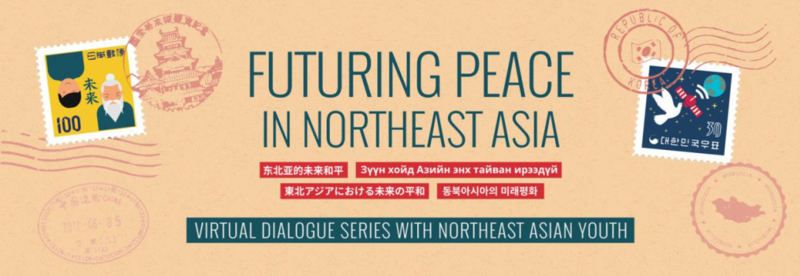
In a joint appeal issued on Saturday, the five UN envoys to the Middle East urged warring parties in the region to work towards an immediate end to hostilities, in line with the Secretary-General’s recent call for a global ceasefire during the COVID-19 pandemic.
Joint Appeal by the UN Secretary-General’s Envoys to the Middle East
11 April 2020
On 23 March,...
Religious leaders of all faiths are being urged by the UN Secretary-General to join forces and work for peace around the world and focus on the common battle to defeat COVID-19.
On 23 March, the Secretary-General launched an appeal for an immediate Global Ceasefire, urging all warring parties to pull back from hostilities, put aside mistrust and animosity, and silence their guns. Many parties have responded positively to the Secretary-General’s appeal, but more needs to be done to translate these words into actions.
Too many in the Middle East have endured conflict and deprivation for far...
While the COVID-19 pandemic is first and foremost a health crisis, its implications are more far-reaching and could threaten global peace and security, the UN Secretary-General told members of the Security Council in a closed video-conference held on Thursday.
Page also available in Japanese, Korean and Mongolian.
Northeast Asia: Northeast Asia is home to one fifth of the world’s people and makes up one quarter of the world's gross domestic product. The region is still grappling with historical and territorial disputes. DPPA advocates for differences to be managed and resolved peacefully and encourages Northeast Asian countries to expand their coordination and collaboration.
Korean Peninsula: The situation on the Korean Peninsula is one of the longest-standing issues before the United Nations. The Security Council first adopted a resolution on the Democratic People’s Republic of Korea (DPRK) nuclear issue in 1993, when it urged the Democratic People’s Republic of Korea not to withdraw from the Treaty on the Non-Proliferation of Nuclear Weapons. DPPA’s objective is to contribute to furthering efforts to reach a peaceful, negotiated solution of the outstanding issues on the Korean Peninsula, with a priority on supporting the parties to step up efforts to build trust, reduce tension and supporting dialogue for sustainable peace and complete and verifiable denuclearization.
DPPA presence and activities: DPPA is the lead entity supporting the Secretary-General in the UN’s efforts to prevent and resolve conflicts at the global level, and proactively partners with UN Women and other entities in advancing the Women, Peace and Security (WPS), as well as the Youth, Peace and Security (YPS) agendas. DPPA’s Asia and the Pacific Division in New York and the liaison presence in Beijing, which interacts with the Shanghai Cooperation Organization, in a spirit of joint work with other UN entities, prepares briefings to the Security Council, conducts political analysis, supports the Secretary-General's good offices and preventive diplomacy efforts, carries out capacity building, and builds partnerships with other entities.
DPPA’s Programme to Support Cooperation in Northeast Asia allows the UN system to, inter alia: (i) facilitate the participation of regional representatives in UN fora; (ii) support UN/DPPA engagement and partnerships; (iii) facilitate UN initiatives in and on Northeast Asia; and (iv) contribute to UN coherence. DPPA’s Security Council Affairs Division provides support to the functioning of the Security Council as well as to the works of its subsidiary organs, including the Security Council Committee established pursuant to resolution 1718 (2006).
As per the Secretary-General’s vision on prevention, the “UN is not the only actor, and in many cases not even the most important actor. The ultimate goal is not to expand our remit but to make a real difference for people, especially the most vulnerable. As the anchor of multilateralism with universal membership, the UN has unparalleled capacity to convene and mobilize. The UN system is most impactful when truly enabling others. This means building meaningful partnerships with the widest array of Governments, regional organizations, international financial institutions, civil society organizations, academia and the private sector, always being truthful to our mission as the guardian of the international norms that the Organization has generated over the past seven decades”.
DPPA is in regular contact with its governmental, regional and sub-regional organizations counterparts, as well as with other entities. The Department coordinates the UN system in this endeavour, including by ensuring information-sharing and cooperation on regional or country-specific issues of mutual concern. For Northeast Asia, partnerships and cooperation with other entities include:
|
|
Seminar on Women, Technology, and Peace | 16-17 December 2024, Tokyo, Japan
DPPA, in partnership with UN Women and the Global Partnership for the Prevention of Armed Conflict (GPPAC) convened a two-day in-person seminar on the topic “Women, Technology, and Peace” in Tokyo, Japan. The rapid development of emerging technologies and artificial intelligence was discussed in the context of the Women, Peace and Security (WPS) agenda. The seminar provided an opportunity for participants from governments, civil society and cyber, AI, and WPS practitioners to discuss challenges and best practices on issues such as the role of technology in advancing gender equality; the nexus between the WPS agenda and technology; and incorporating a gendered perspective in cybersecurity policies such as in WPS and other National Action Plans.
13-14 June 2023, Ulaanbaatar, Mongolia
Following, the regional dialogue in December 2019 in Beijing, China, on 13-14 June 2023, DPPA, in partnership with the Ministry of Foreign Affairs of Mongolia, UN Women, and the Global Partnership for the Prevention of Armed Conflict (GPPAC), convened a two-day in-person dialogue on the Women, Peace and Security (WPS) agenda in Northeast Asia in Ulaanbaatar, Mongolia. The dialogue brought together government officials, academics, and representatives from civil society from Mongolia, Japan, and the ROK. The participants discussed regional trends, increased tensions and risks, including nuclear, in the region and the continued marginalization of women in peacebuilding, preventive diplomacy, and the security sectors. The dialogue also provided an opportunity for the participants to learn and have a fruitful exchange about Japan and the ROK’s 1325 National Action Plan (NAP) as Mongolia is envisaging to restart discussions on its NAP. This year, a young peacebuilder from Mongolia also joined the interactive discussions, with the participants exploring the nexus between the WPS and the Youth, Peace and Security (YPS) agendas. The dialogue was followed by the Ulaanbaatar Dialogue on Northeast Asian Security and the First Female Foreign Ministers Meeting hosted by the Foreign Minister of Mongolia.
Futuring peace in Northeast Asia is an initiative by the United Nations Department of Political and Peacebuilding Affairs (DPPA) dedicated to bridging the generational gap and strengthening opportunities for Northeast Asian youth to share their unique observations for regional peace and security with policymakers, scholars, and governments in the region. The aim is to strengthen their advocacy capacities in line with the New Agenda for Peace, the SDG 2030 agenda, and UN Security Council Resolutions 2250 (2015), 2419 (2018) and 2535 (2020) on Youth, Peace and Security (YPS). In a region that lacks common security structures, the project enables the capacity of young people to be at the forefront of regional policy discussions, demonstrating that intergenerational interaction can help identify the challenges and opportunities ahead.
Phase I (2021)
The first phase of the project in 2021 was implemented in partnership with the United Nations Educational, Scientific and Cultural Organization (UNESCO) and focused on building capabilities for digital facilitation and utilizing Futures Literacy methodology considering the specific regional context. During a series of virtual dialogues, over 40 youth peacebuilders from China, Japan, Mongolia, and the Republic of Korea imagined scenarios set in 2040, imagining how digital literacy education, new technologies and innovative approaches could strengthen cross-border ties. They recognized the criticality of building shared regional experiences that would enable a peaceful future through for instance education systems, academic exchanges, and cultural assets such as movies and literature.
Phase II (2022)
In 2022, the initiative was implemented in collaboration with the Swiss foreign policy think-tank foraus and co-designed and co-facilitated by Northeast Asian youth. From April to September 2022, four workshops were held where the youth peacebuilders used strategic foresight tools to develop concrete policy recommendations for policymakers, exploring pathways to a peaceful future for the region. Questions were framed using the “Futures Triangle” approach, probing participants to think about future outcomes by looking at three dimensions: the push of the present, the pull from the future, and the weight of the past. Through collective scenario building and testing, they identified four key policy avenues, including establishing digital literacy programs, furthering educational and technological cooperation, creating a regional youth parliament, and fostering an inclusive Metaverse.
As an outcome of the initiative, a youth-drafted policy report on the future of collaboration and narrative building in Northeast Asia was launched on World Futures Day 2 December 2022 at the United Nations Headquarters in New York, with Assistant Secretary-General for Asia and the Pacific Khaled Khiari, youth peacebuilders, regional experts and UN partners present.
In addition, in 2022 APD supported youth representatives to attend multiple policy platforms. At the Ulaanbaatar Dialogue on Northeast Asian Security (UBD) in June 2022, DPPA, the Mongolian Ministry of Foreign Affairs and the Institute for Strategic Studies jointly organized a youth panel. Youth participants also attended the Climate Change and Youth Forum in Mongolia in August 2022, where they moderated a session on Global Warming and Greenhouse Gas Emissions and facilitated a group work session on strategic foresight, and at the Transforming Education Summit in New York in September 2022, sharing insights on education and technology as enablers for peace in the region.
UN WebTV video of Ms. Ijun Kim as a youth peacebuilder in the Futuring Peace in Northeast Asia project: Ijun's Future: Foresight for Peace | UN Web TV
Phase III (2023)
In 2023, the project focused on policy bridging and supporting youth voices at relevant regional policy fora through events at: (i) Tsinghua University and the North-East Asia Regional Power Interconnection and Cooperation Forum 2023 organized by ESCAP in Beijing (China); (ii) Yonsei University, the National Assembly Futures Institute (NAFI), and the Jeju Forum (Republic of Korea); (iii) the Ulaanbaatar Dialogue for Northeast Asian Security (Mongolia); (iv) Sophia University and the 2023 Internet Governance Forum annual summit (Japan).
In these foras, youth were given a seat at the table in regional discussions and a platform to share their perspectives on regional issues, enabling them to network and connect with policymakers, government officials, NGOs, scholars, and youth. In the discussions, youth emphasized the importance of dialogue, and the need for regional digital literacy education programs to counter the negative impacts of misinformation and a fragmented internet landscape in the region. They also discussed their proposal for a Northeast Asia Youth Climate Council which could address the gap of a lack of a regional mechanism and inclusion of youth in respective national policy spaces.
UN WebTV video of that follows five youth peacebuilders from Northeast Asia and their session at the 2023 Internet Governance Forum in Kyoto, Japan in October 2023: Beyond Boundaries: Futuring Peace in Northeast Asia | UN Web TV
Phase IV
In 2024, the initiative extended the network of young peacebuilders from Northeast Asia to the Pacific region, to strengthen their advocacy capacities in line with the Pact for the Future and the SDG 2030 agenda. Youth peacebuilders from the two regions worked together to increase regional cooperation to address common challenges such as climate change, unregulated emerging technologies, internet fragmentation, mis- and disinformation and hate speech, and enhancing the representation of women and youth in policy dialogues. Throughout the year, DPPA facilitated active intergenerational discussions between youth peacebuilders, experts, government officials and the UN system in support of inclusive political strategies.
In January 2024, DPPA and Finland co-hosted a Youth, Peace and Security (YPS) roundtable in the UN Secretariat, engaging youth, the UN system and Member States. DPPA Assistant Secretary-General for the Middle East, Asia and the Pacific, Mr. Khaled Khiari, opened the roundtable. The discussion focused on pathways to meaningful youth participation among Northeast Asian youth, and youth peacebuilders presented the status and next steps of their recommendations.
Link to UN WebTV video from Samoa workshop: Empowering Pacific & NE Asia Youth: Peacebuilders & Climate Advocates Workshop | UN Web TV
In May 2024, the initiative supported two youth peacebuilders to participate in a panel session at the Jeju Forum for Peace and Prosperity in the Republic of Korea, discussing regional youth-led initiatives for regional cooperation. Youth participants presented youth policy recommendations focusing on technology, innovation, and digital literacy, and how to avoid internet fragmentation.
DPPA hosted a panel session with youth peacebuilders from China and Mongolia at the Jeju Forum for Peace and Prosperity, Republic of Korea, 29-30 May 2024.
Youth peacebuilders have also continued advancing their policy recommendations from the earlier phases of the project, including for the establishment of a Northeast Asia Youth Climate Council as a dedicated regional entity. Youth with support from DPPA, convened a Preparatory Meeting for the launch of the Northeast Asia Youth Climate Council in Ulaanbaatar, Mongolia on 5 June 2024. The meeting was a space for youth representing a wide range of climate organizations in the region to network and was an opportunity to strengthen partnerships and increase visibility of the Council with the UN system and other partners. The Council aims to build capacity for meaningful youth engagement in environmental policy and decision-making. The key findings from the meeting were presented at the Ulaanbaatar Dialogue on Northeast Asian Security (UBD) on 6-7 June 2024 to signal the upcoming launch of the Council and encourage intergenerational solidarity.
These engagements have provided youth peacebuilders with an opportunity to present and discuss the recommendations with experts and have proved valuable opportunities to exchange ideas and perspectives on the regions’ futures and explore ways to promote peace and collaboration. The project received positive feedback from stakeholders and Member States in both regions.
For more information:
Project website: https://futuringpeace.org/NEA/
Interview with participants in DPPA’s Politically Speaking (December 2021) : https://dppa.medium.com/creating-a-collective-language-youth-from-northeast-asia-imagine-the-future-of-the-region-97e411135a7d
UNESCO’s Futures Literacy : https://en.unesco.org/futuresliteracy
DPPA and ODA online learning series with Northeast Asian young leaders, April-December 2020
The UN Security Council Resolutions 2250 (2015), 2419 (2018) and 2535 (2020) on Youth, Peace and Security (YPS) provide a framework for the UN to promote a more meaningful participation of youth in peace and security processes. The adoption by the UN General Assembly of Resolution 74/64 on “Youth, disarmament and non-proliferation”, tabled by the Republic of Korea (ROK) on 21 October 2019 and co-sponsored by 84 Member States, including Japan, the People’s Republic of China and Mongolia, created another entry point for multilateral policy and confidence-building initiatives with young people in the region.
In 2020, DPPA and the UN Office for Disarmament Affairs (ODA) launched a joint project to bring together a group of Northeast Asian young leaders to discuss disarmament and non-proliferation issues. Since April, the joint team has worked with eight youth leaders from the ROK, Japan, China and Mongolia to train and build their capacity on disarmament, non-proliferation, gender, new technologies and civil society action. The participants participated in a series of virtual discussions with UN officials, independent experts, academics and civil society representatives.
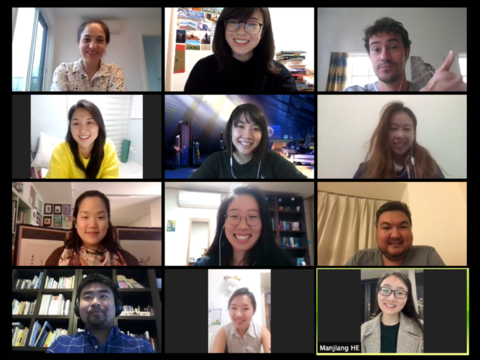
The project also connected youth with senior policy makers in the region. On 2 December, a participant of the project spoke at a youth special session convened for the first time as part of the annual ROK-UN Joint Conference on Disarmament and Non-Proliferation Issues, in line with the ambition to build bridges between decision-makers and young people. Members of the group also recorded an episode for ODA’s Disarmament Today podcast and wrote an article for DPPA’s Politically Speaking to reflect on their experiences.
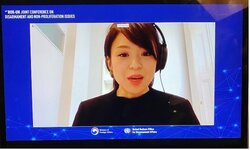
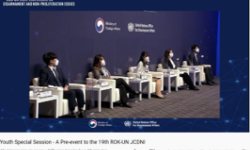
To learn more about DPPA’s youth champions in Northeast Asia, please click here for a poster about the project and the participants.
Please find the links to the young leaders' policy papers and their perspectives:
Note: These policy papers were developed in the course of a regional project and reflect solely the views of their authors. They do not necessarily reflect the official position of the United Nations or its Member States nor do they entail their endorsement.
10 December 2019, Beijing, China
DPPA, in close cooperation with UN Women and the Stockholm International Peace Research Institute (SIPRI), organized a regional expert discussion on Northeast Asian countries’ contributions to the Women, Peace and Security (WPS) agenda. The event in Beijing on 10 December gathered more than 30 participants from China, Japan, Mongolia and the Republic of Korea to discuss progress of WPS implementation in the region in light of the 2020 anniversaries of the Beijing+25 process and the 20th anniversary of UN Security Council Resolution 1325. At the event, SIPRI launched its background paper on emerging role of the ROK and Japan in WPS. The Beijing consultations provided an opportunity to strengthen regional networks and allowed experts from the region to discuss challenges and to share best practices amongst each other.
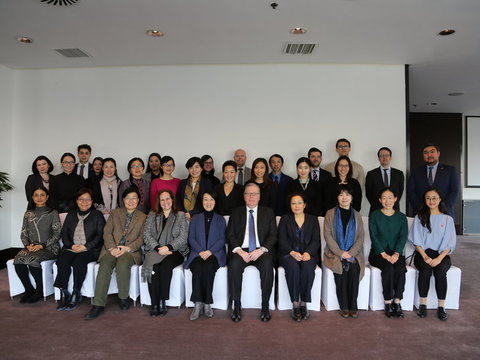
See link to Women, Peace and Security: Voices from Northeast Asia (March 2021).
28 September 2019, New York, USA
I am pleased to again send my warm greetings to the 2019 Global Peace Forum on Korea. Last year, the Korean Peninsula experienced momentous developments. We witnessed summits and family reunions. And many commitments were made. Today, the international community is eager for talks to resume and progress to be made.
I am glad that the United Nations has been a platform for the two Koreas to send messages of collaboration and peace. Over the past 12 months, the Panmunjom Declaration was circulated as an official document of the General Assembly and Security Council; traditional Korean wrestling was listed as Intangible Cultural Heritage thanks to a joint application from both Koreas, and the World Taekwondo and International Taekwon-Do Federation promoted peace at the United Nations Office at Geneva.
These symbolic steps are crucial. But more is needed. The Secretary-General continues to urge the Democratic People’s Republic of Korea to begin working-level talks with the United States, as agreed by the two leaders in June, and to resume inter-Korean dialogue. The summits involving the leaders of the Democratic People’s Republic of Korea and the Republic of Korea and United States respectively remain important milestones.
They have built an atmosphere conducive to advancing sustainable peace and complete and verifiable denuclearization on the Korean Peninsula, in accordance with the relevant Security Council resolutions. There could be setbacks, but there is now a foundation to make tangible progress on the core issues. The United Nations system and our Good Offices are available to support the diplomatic efforts of the parties. I wish you great success in the discussions ahead and look forward to the results of the forum. Thank you.
3 to 4 June 2019, Ulaanbaatar, Mongolia
It is beyond question that young people must be included in discussing peace and security issues, including in peace negotiations. On 3 and 4 June 2019, DPPA, in partnership with the Ministry of Foreign Affairs of Mongolia, the UN team in Mongolia, the United Nations Development Programme (UNDP), and the United Network of Young Peacebuilders (UNOY) brought together young people from all around Northeast Asia to discuss the youth, peace and security agenda and perspectives for dialogues in the region. Khishigjargal Enkhbayar, a former Coordinator at the UN Youth Advisory Panel in Mongolia, wrote about the experience here. The workshop was mentioned in the Secretary-General’s first report on Youth and peace and security issued on 2 March 2020.
This Week in DPPA is a brief roundup of political and peacebuilding events and developments at UNHQ and around the world.
COVID-19West Africa and the Sahel: Together, we will defeat COVID-19 Libya: Call for immediate cessation of hostilities and unity to combat COVID-19 Lebanon: Meeting of the International Support Group Yemen: Ceasefire to avert COVID-19
|
|
Peacebuilding Commission meeting on the impact of COVID-19
Security CouncilBriefing on the new EU operation in the Mediterranean
SomaliaObservance of International Mine Awareness Day
|
Subscribe to This Week in DPPA by clicking here: Sign Up Now
Contact DPPA at dppa@un.org
A ceasefire declaration by Saudi Arabia in war-shattered Yemen that was due to come into effect on Thursday has been welcomed by United Nations chief António Guterres as a way to promote peace and slow the advance of COVID-19.
The Syrian air force used deadly chemical weapons in three separate attacks in March 2017 on the central town of Ltamenah that affected a total of at least 106 people, the Organization for the Prohibition of Chemical Weapons (OPCW) said in a report on Wednesday.
The Syrian air force used deadly chemical weapons in three separate attacks in March 2017 on the central town of Ltamenah that affected a total of at least 106 people, the Organization for the Prohibition of Chemical Weapons (OPCW) said in a report on Wednesday.
The COVID-19 pandemic should not be politicized as unity is the “only option” to defeat the disease, the head of the World Health Organization (WHO) said on Wednesday.
As the COVID-19 pandemic plagues the world, the head of the UN peacekeeping mission in Mali told the Security Council on Tuesday that the mission continues to fulfill its mandate while doing whatever it can to prevent the coronavirus outbreak from overrunning the country.
Fighting must stop immediately in Libya if it is to have any chance of staving off the COVID-19 outbreak, the top United Nations official in the North African country said on Tuesday as he condemned an attack on a major Tripoli hospital.
1. On 2 April 2020, the representatives of the Guarantor institutions of the Peace, Security and Cooperation Framework (PSC Framework) for the Democratic Republic of the Congo and the region held a consultative meeting via videoconference. The main purpose of the meeting was to discuss the impact of the COVID-19 pandemic on the region, and the impact on the implementation of the PSC Framework, including the holding of the 10th Summit of the Regional Oversight Mechanism (ROM),...
Parties to Syria’s brutal civil war, now in its tenth year, failed to abide by their obligations under international law to avoid attacks on hospitals and other civilian facilities that featured on the UN’s so-called deconfliction list, Secretary-General António Guterres said on Monday.
The UN has condemned the shelling of the women’s section of the Central Prison in a district of Yemen’s war-torn Taizz Governerate, in the south of the country, which has left at least five women and one child dead, and wounding more than 11, with casualties expected to rise.
Decades ago, millions of landmines were buried in countries around the globe, and today the world is in the throes of a deadly COVID-19 pandemic, the UN chief said on Saturday, noting that in both situations, the most vulnerable remain at risk.
Even as UN peacekeepers adapt to the challenges posed by the coronavirus, they continue to perform their vital peace and security tasks while helping to stem the spread of the COVID-19 pandemic.
The Secretary-General remains deeply concerned that the coronavirus continues to spread at an alarming rate, including into countries where millions of people cannot easily access clean water, food, healthcare and shelter. Given the potentially devastating impact on some of the world’s most vulnerable countries, the Secretary-General stresses the need for a concerted, coordinated global response that encompasses communities such as refugees, migrants, stateless people, those...
The unfolding COVID-19 pandemic is so far having little impact on the global food supply chain, but that could change for the worse – and soon – if anxiety-driven panic by major food importers takes hold, the World Food Programme (WFP) warned on Friday.
There should be only one fight in our world today, the United Nations Secretary-General said on Friday, issuing a loud clarion call to join “our shared battle against COVID-19”.
There should be only one fight in our world today, the United Nations Secretary-General said on Friday, issuing a loud clarion call to join “our shared battle against COVID-19”.
This Week in DPPA is a brief roundup of political and peacebuilding events and developments at UNHQ and around the world.
COVID-19Colombia: Let’s focus on the true fight of our lives Somalia: We must all unite to prevent the spread of the virus For up-to-date information on COVID-19 and its impact, please visit: WHO website UN coronavirus website
Security CouncilCouncil adopts four resolutions amidst pandemic
|
Pedersen: COVID-19 “an enormous threat to Syrians”
Mladenov: “The situation on the ground remains fragile” Please see the Security Council website for an updated program of work.
|
Subscribe to This Week in DPPA by clicking here: Sign Up Now
Contact DPPA at dppa@un.org
Full Transcript of UN Secretary-General's Press Briefing about Appeal for Global Ceasefire Following Outbreak of COVID-19
Ten days ago, I issued an appeal for an immediate ceasefire in all corners of the globe to reinforce diplomatic action, help create conditions for the delivery of lifesaving aid, and bring hope to places that are among the most vulnerable to the COVID-19 pandemic.This call was rooted in a fundamental...
The risk of the COVID-19 pandemic having a devastating impact on war-torn Syria is intensifying, where six million are displaced, living in conditions that make them particularly vulnerable to the deadly virus, the Senior Humanitarian Advisor to the UN Special Envoy to Syria warned on Thursday.
Two United Nations agencies came together Tuesday to urge the international community not to overlook the on-going plight of millions of refugees and migrants from Venezuela, as the COVID-19 pandemic continues to spread around the world.
Deaths from COVID-19 have more than doubled in the past week and will soon reach 50,000 worldwide, while the global caseload is heading towards one million, the head of the World Health Organization (WHO) told journalists on Wednesday.
The UN system in Nigeria and its partners are working to reduce the spread of the new coronavirus disease in some of the most vulnerable areas in the country: communities and camps housing millions of internally displaced people (IDPs) uprooted by the Boko Haram insurgency in the northeast.